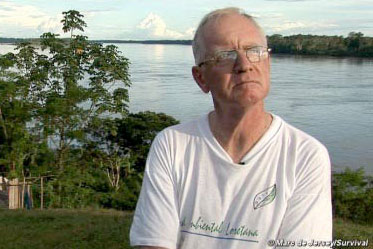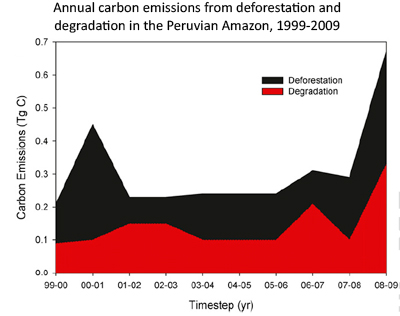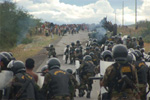Maybe it’s the Motorcycle that’s the Problem?
There are very few times in life that you get to see a priest on a motorcycle. Fewer still that same-said priest zips off from a training session on REDD and forestry law back to his school for Indigenous youths located in the heartland of the Amazon, next to a prison and down the road from the rapidly growing city-center of Iquitos, Peru.
Meet Brother Paul McAuley. Striped button-down shirt neatly tucked in, ropes of semilla (seeds, for the grigos) necklaces laced around his neck, this man is one of the most outspoken individuals there is when it comes to campaigning for indigenous rights in Peru.
And after 20 years, the Peruvian government has finally decided that they’ve had enough–they want this so-called agitator to go home to his native Britain and have accused him of “shatter[ing] democratic values” by inciting the indigenous groups in the area to stand up for their legal rights, explaining the potential dangers of oil exploration and logging, and educating them about the power they have to influence the government’s decision-making process.
 Courtesy of Survival |
Of course, “home” is a relative term. After 20 years, one might wonder exactly what McAuley would consider home these days. And if educating people about their rights is an example of inspiring unrest, then brother Paul is decidedly unapologetic. As he told the BBC,
“Education is often accused of inciting people to understand their rights, to be capable or organizing themselves to ensure their human rights…if that’s a crime, then yes I’m guilty. As a member of a Catholic order, my life’s been dedicated to human and Christian education.”
On June 11th, 2010, the government of Peru issued a ministerial resolution canceling his residency without reason or option for appeal. In response, McAuley mounted a legal defense that resulted in a negation of the resolution and the continuation of his residency. One battle temporarily won, McAuley began the process of extension for his legal residency, only to come up against a new, and more subtle, form of resistance. A procedure which for the past 20 years had taken a matter of hours is still being processed–after it’s submission on August 9th.
There has been local as well as international backlash against McAuley’s situation. Everything from public protests to local marriage offers have been proffered to support the man who has become an integral part of this community. In a recent letter to the Peruvian government signed by 15 organizations including Amazon Watch, Center for International Environmental Law, the Rainforest Foundation, and Survival International, groups expressed their “…deep concern over potential political motives behind the challenges and delays in the process of renewal of residence. [There is concern] that it is an attempt to oust the country’s Brother Paul McAuley through administrative action, without giving him the opportunity for due process. [This case is viewed] in a context of concern about the restriction of freedom of thought, expression, association, assembly and movement in Peru, and the right to defend human rights…”
McAuley’s battle is just one piece of the puzzle. Peru has over 65 million hectares of Amazon tropical forests, 9 million hectares of which are covered by titled indigenous territories in various regions throughout the Amazon.
 Annual emissions of carbon from deforestation and degradation mapped from time-series CLASlite imagery and LiDAR data. Image courtesy of Asner et al. 2010. Click image to enlarge. |
Since 2000, Peru has been updating and changing its existing forestry laws. New laws seek to establish management plans as mandatory for all harvesting activities, re-define land classifications, and seek to characterize “forests” through economic value. Current permit systems for timber extraction often promote illegal timber trade by creating legally binding contracts between indigenous communities and timber companies with links to illegal logging practices. Oil and mineral extraction are still rampant, destroying swaths of the Amazon without consequence—while the land may be owned by indigenous groups, land products certainly are not. At the moment, people are fighting lack of transparency above all other issues—while newly implemented legal systems may have destructive consequences, the result of not being informed of their existence or being prohibited from participation is even more alarming.
People are up in arms over current practices, and the thought of another Bagua is starting to rest heavily on people’s minds. McAuley’s is one of the key players in a much larger picture. At the moment, his residency is in question, a fact that did not prevent him from participation in a recent sub-committee meeting over the new “ley forestal” in Peru, a law that, if passed, may prove to be a further menace to indigenous rights to land and resources. Paul McAuley is trying to help people understand what is happening in their own lives and give them some mechanism to take control back—and given these circumstances, threatening to exorcise a man for his outspokenness against lack of transparency seems—well, oddly transparent.
Related articles
Peru’s rainforest highway triggers surge in deforestation, according to new 3D forest mapping

(09/06/2010) Scientists using a combination of satellite imagery, airborne-laser technology, and ground-based plot surveys to create three-dimensional high resolution carbon maps of the Amazon rainforest have documented a surge in emissions from deforestation and selective logging following the paving of the Trans-Oceanic Highway in Peru. The study, published this week in the early edition of the Proceedings of the National Academy of Sciences, reveals that selective logging and other forms of forest degradation in Peru account for nearly a third of emissions compared to deforestation alone.
Under siege: oil and gas concessions cover 41 percent of the Peruvian Amazon

(02/16/2010) A new study in the Environmental Research Letter finds that the Peruvian Amazon is being overrun by the oil and gas industries. According to the study 41 percent of the Peruvian Amazon is currently covered by 52 separate oil and gas concessions, nearly six times as much land as was covered in 2003. “We found that more of the Peruvian Amazon has recently been leased to oil and gas companies than at any other time on record,” explained co-author Dr. Matt Finer of the Washington DC-based Save America’s Forests in a press release. The concessions even surpass the oil boom in the region during the 1970s and 80s, which resulted in extensive environmental damage.
Amazonian natives say they will defend tribal lands from Hunt Oil with “their lives”

(10/25/2009) Indigenous natives in the Amazon are headed to the town of Salvacion in Peru with a plan to forcibly remove the Texas-based Hunt Oil company from their land as early as today. Peruvian police forces, numbering in the hundreds, are said to be waiting in the town. The crisis has risen over an area known as Lot 76, or the Amarakaeri Communal Reserve. The 400,000 hectare reserve was created in 2002 to protect the flora and fauna of the area, as well as to safeguard watersheds of particular importance to indigenous groups in the region.
Police face murder charges in killing of indigenous protesters in Peru
(08/16/2009) A federal prosecutor in Peru filed murder charges against two police generals and 15 other officers over the deaths of indigenous protesters at a roadblock in June, reports the Associated Press. The Indians were protesting new rules that would have made it easier for foreign developers to exploit oil and gas, timber, and minerals in Peru’s Amazon rainforest. The skirmish left 23 police and at least ten protesters dead.
Peru to proceed with oil and gas auctions in the Amazon despite indigenous protests
(08/07/2009) Despite violent protests by indigenous groups over plans to expand oil and gas exploration in the Peru’s Amazon rainforest, energy investments in the South American country are expected to increase to $1.5 billion in both 2009 and 2010, reports Reuters.
Peru revokes decrees that sparked Amazon Indian uprising

(06/19/2009) Peru’s Congress revoked two controversial land laws that sparked violent conflicts between indigenous protesters and police in the country’s Amazon region. The move temporarily defuses a two-week crisis, with protesters agreeing to stand down by removing blockades from roads and rivers. Congress voted 82-14 Thursday to overturn legislative decrees 1090 and 1064, which would have facilitated foreign development of Amazon land. Indigenous groups said the decrees threatened millions of hectares of Amazon rainforest and undermined their traditional land use rights.
Peru fails to investigate murder of Amazon environmental leader
(04/22/2008) Peruvian authorities failed to respond to requests for protection from Julio Garcia Agapito, the environmental leader who was gunned down in southeastern Peru in late February, according to a new petition which calls for an investigation into his murder. Julio Garcia’s killing at the hands of an illegal logger set off international outcry and highlighted rising tensions over the paving of a highway in the Amazon rainforest.
Amazon environmentalist gunned down in Peru
(03/14/2008) After reporting a truck loaded with mahogany illegally logged from the Amazon rainforest, Don Julio Garcia Agapito, a Peruvian environmentalist was gunned down by unknown assailants on February 26th, 2008. He is survived by his family.